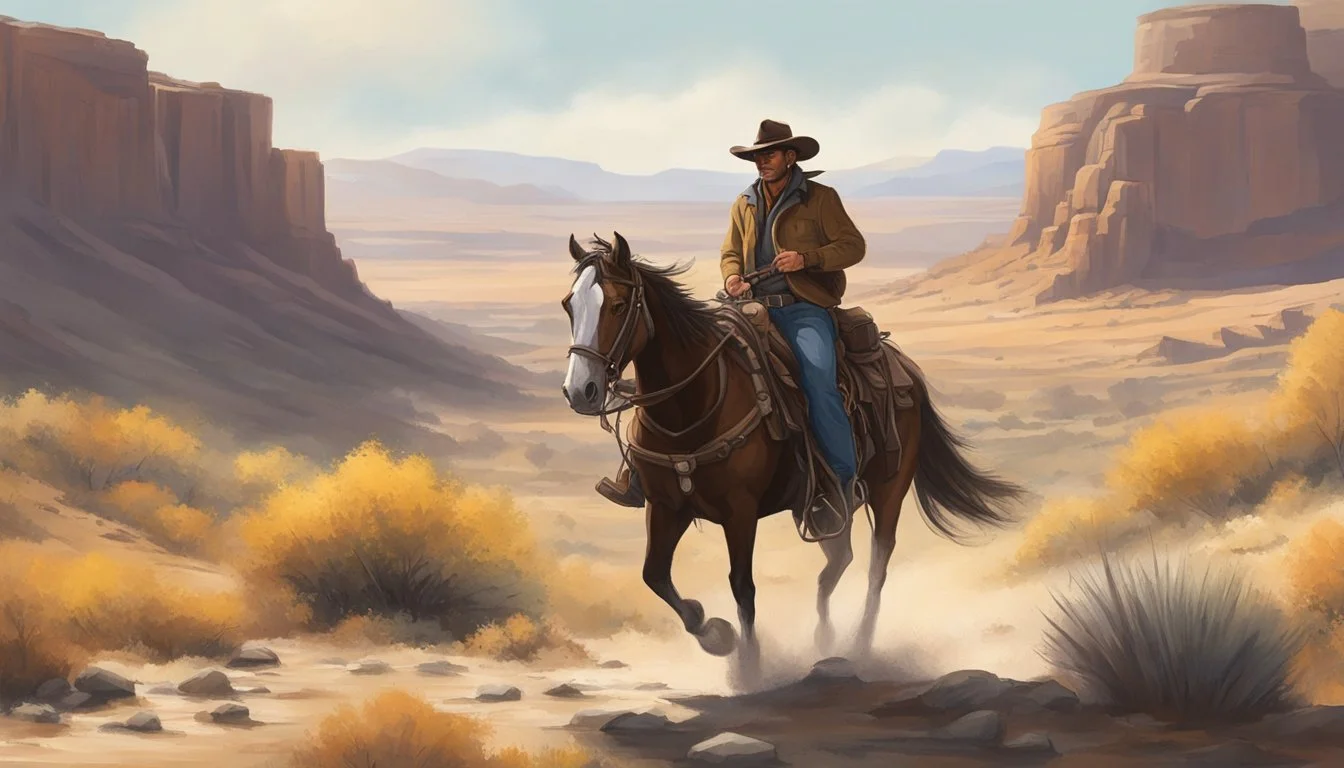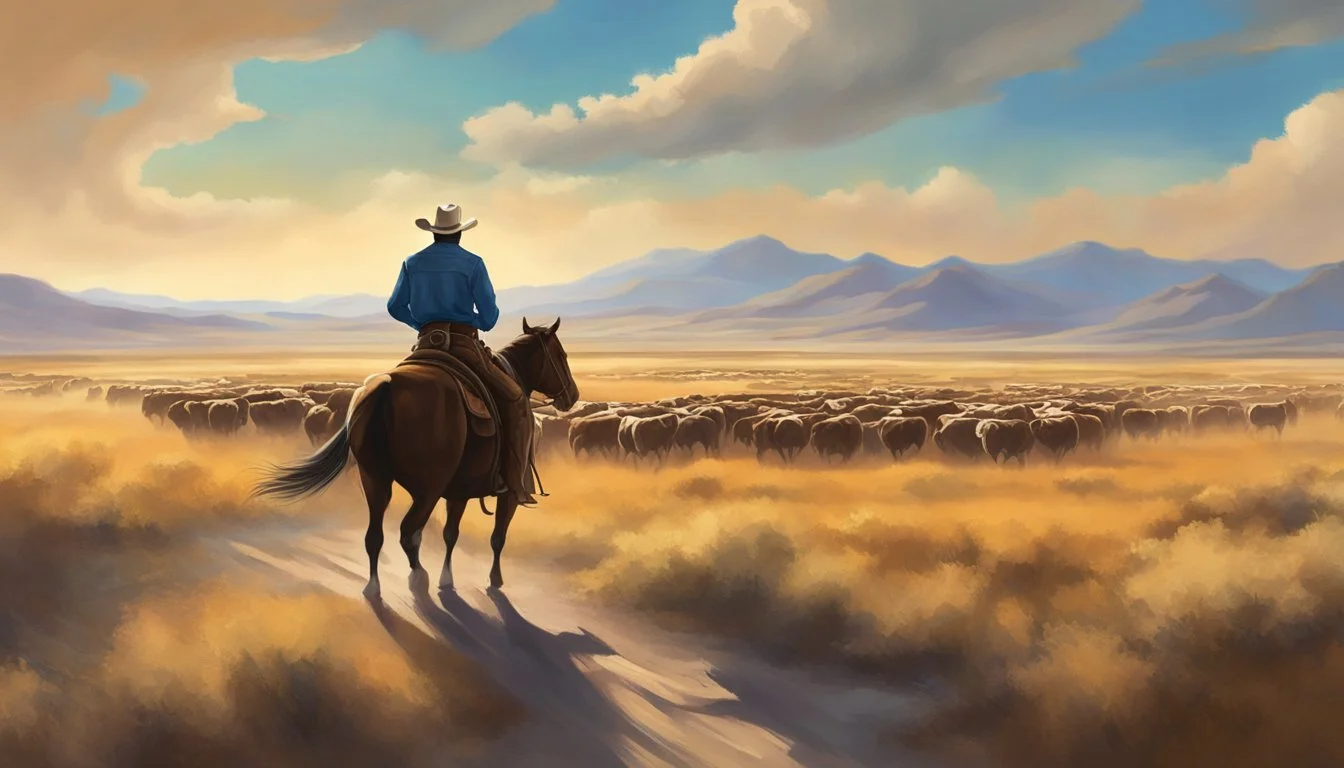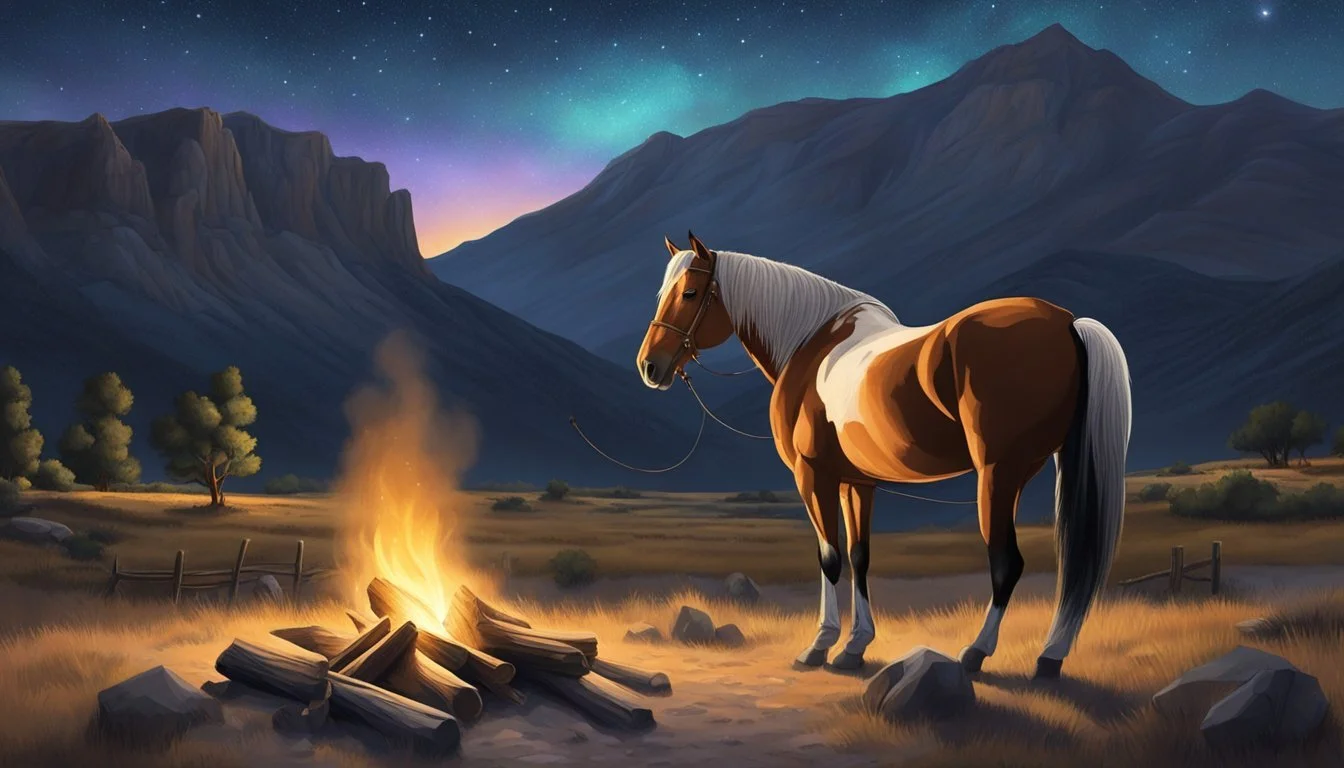The Unwritten Code
Exploring the Core Principles of Cowboy Ethics
The American Cowboy is an iconic figure, symbolizing the rugged individualism and adventurous spirit of the Wild West. This character, often romanticized in literature and film, lived by a set of unwritten rules known as Cowboy Ethics. While these guidelines were never formally codified, the ethos shaped by the challenges of frontier life became deeply embedded in the culture and identity of the American West.
Cowboy Ethics consist of a series of values that emphasize morality, strength of character, and respect for the land as well as for others. Rooted in the practical needs of managing cattle and navigating the lawless expanse, these principles dictated a way of life that honored integrity, courage, and self-reliance. The cowboys' moral compass was guided by the natural laws of their unforgiving environment, compelling them to develop a sense of fairness and an uncompromising stance on justice and personal responsibility.
Understanding Cowboy Ethics provides insight into the underlying values that molded the American frontier's societal norms. These values have transcended time, continuing to influence modern-day conduct and inspiring countless individuals to strive for a principled existence reflective of the honor and dignity embraced by the cowboys of yesteryear.
The Birth of Cowboy Culture
During the 19th century, America’s western frontier was the breeding ground for a new societal figure – the cowboy. Stemming from a melding of Spanish, Native American, and settler influences, these hardy individuals became emblematic of what was later coined as "cowboy culture."
The origins of the cowboy are deeply intertwined with vaqueros, the skilled horsemen and cattle herders of Spanish Mexico. As American settlers moved westward, they adapted the vaquero tradition, instilling their own values into the developing cowboy archetype.
Key Aspects of Early Cowboy Culture:
Heritage: The blend of Spanish vaquero skills and aspects of Native American horsemanship.
Livelihood: Driving cattle over long distances across the often-unforgiving terrain of the Old West.
Self-reliance: A necessity brought about by the vast and often isolated nature of the frontier.
Inhabitants of the Old West faced harsh environments that demanded not just physical toughness but also moral fortitude. This resulted in a set of informal guidelines known as the “Code of the West,” which, although never officially documented, became the tacit ethos guiding cowboy behavior.
The cowboy became a symbol of American values such as integrity, courage, and self-reliance. Their lifestyle was not one of solitary existence but rather one of community and interdependence, where the welfare of the group often hinged on the actions of the individual.
Influence on Modern Perception:
Popular Media: Novels and silver screen portrayals romantically embellished the cowboy image, entrenching it in the American consciousness.
Lasting Legacy: While modern cowboys are part of a more technologically advanced and regulatory society, many still adhere to the values of their Old West predecessors.
Key Principles of Cowboy Ethics
The principles of Cowboy Ethics encompass a set of timeless values and moral guidelines that have historically governed the behavior and decisions of cowboys. These unwritten rules, often referred to as the "Code of the West," emphasize strong character traits and a communal sense of living.
Courage and Resilience
Cowboys are known for their courage to face danger and their resilience in overcoming adversity. They live each day with courage, embodying bravery whether they’re confronting the elements or personal challenges.
Honesty and Integrity
Honesty and integrity stand as the cornerstones of cowboy ethics. Cowboys hold personal integrity in high regard, ensuring that truthfulness and uprightness are present in every deal.
Respect and Community
Respect for others is integral in cowboy culture. It fosters unity and maintains the fabric of the community—respect is not just for individuals but for the land and all creatures as well.
Loyalty and Trustworthiness
The cowboy lives by loyalty and trustworthiness, qualities embodied in the adage "ride for the brand." Loyalty extends to one’s group and the mission at hand, breeding trust and dependability.
Work Ethic and Responsibility
Cowboys exhibit a strong work ethic; they do what has to be done with pride. Their principle of "finish what you start" instills a sense of responsibility and an accomplishment in their tasks.
Fairness and Justice
Fair play and justice are essential in cowboy ethics, ensuring everyone gets an equal chance, and that right always prevails. They deal fairly in every aspect of life, from business to personal conduct.
Self-Reliance and Resourcefulness
Self-reliance is vital, as cowboys must often rely on their wits. Resourcefulness in the face of hardship and the ability to use what’s on hand are prized traits, ensuring survival and success.
Unwritten Rules and the Cowboy Code
Strict adherence to unwritten rules defines cowboy behavior. Cowboy ethics and the Code of the West dictate a way of life that, while unspoken, is understood and strictly followed by those who live by the code.
The Cowboy Way of Life
The cowboy way of life is defined by rigorous day-to-day duties and a profound connection with nature, framed by a tight-knit community and a solid code of ethics that includes work ethic, respect, and pride.
Day-to-Day Duties
Cowboys start their days early, often before sunrise, to tend to the essential tasks that define ranch life. Roping and riding are foundational skills, with cowboys spending much of their time on horseback, herding cattle across the range. The horse is an indispensable partner in these duties, aiding in the management of livestock. Cooks play a crucial role in sustaining the team with hearty meals, essential for maintaining energy levels for the physically demanding work.
Riding: Covering vast terrains to monitor and move livestock
Roping: Catching cattle for branding or medical treatment
Maintenance: Repairing fences, barns, and ensuring the well-being of the horses and cattle
Community and Social Structure
Community is paramount in cowboy culture, fostering unity and cooperation. Respect for each individual's role, from the boss to the cook, facilitates smooth operation and mutual support. Cowgirls, too, are integral, often working alongside cowboys or managing their own duties within the community. Law enforcement within these close-knit circles is built on a shared understanding of right and wrong, with an emphasis on mutual respect.
Hierarchy: From the ranch owner to the hands on the ground, each person knows their role.
Social Gatherings: Bonding with friends at a local bar or community event.
Challenges and Coping Mechanisms
Cowboys face adversity daily, braving a harsh environment that can leave them tired, cold, hungry, or thirsty. Resilience is a hallmark of their coping mechanisms—continuing to work despite the elements. Their deep respect for the land and animals provides the fortitude needed to overcome such difficulties.
Environmental Hardships: Combatting weather extremes and rough terrain.
Mental Strength: Holding onto pride and purpose during tough times.
Leisure and Recreation
Even amid the hardships, cowboys find time for rest and recreation. Leisure activities might include a friendly competition in roping or riding, storytelling around campfires, or playing music. Their downtime is often spent in the company of fellow cowboys and cowgirls, recounting the day's events or simply enjoying a moment to relax.
Festivities: Engaging in rodeos and local celebrations of cowboy culture.
Quiet Time: Enjoying moments of solitude in the vast open range.
Relationship with Nature
Cowboys maintain a symbiotic relationship with the terrain they steward, understanding its cycles and patterns. They exhibit a profound respect for nature, from the grasslands they traverse to protect the livestock from predatory threats, to the rivers and streams that provide water. This deep connection is intrinsic to the cowboy ethos and their survival.
Stewardship: Managing the land sustainably to ensure its continued bounty.
Harmony with Wildlife: Interacting responsibly with the ecosystem's inhabitants.
Iconic Figures and Cultural Influence
This section explores the standout personalities that shaped the classic cowboy ethos, their depiction in American media, and the enduring societal reverberations of this cultural cornerstone.
Legends of the West
The Wild West provided a backdrop for stories of individuals who embodied cowboy ethics, a set of unwritten principles revolving around honor, courage, and self-sufficiency. Figures such as Buffalo Bill and Wild Bill Hickok have been etched into the annals of American history as quintessential examples of these values, turning them into folk heroes and pillars of cowboy culture.
The Cowboy in American Media
John Wayne, Roy Rogers, and Gene Autry are synonymous with the cinematic representation of the cowboy. Their portrayals in film and television helped cement the image of the cowboy as an American hero and an inspiration. These actors showcased the cowboy as living by a code of conduct that often involved unwavering integrity and a form of frontier justice.
John Wayne: Emblematic of rugged masculinity and moral fortitude.
Roy Rogers: Known for his good natured roles and musical talents.
Gene Autry: The 'Singing Cowboy,' intertwined music with cowboy narratives.
Cultural Impact and Legacy
The American cowboy remains an iconic symbol of culture and values across the United States. The influence of cowboy ethics has extended beyond the Wild West, impacting American strategy and the wider cultural ethos. This legacy grants implicit permission for individuals to aspire to a life governed by respect, resilience, and personal accountability. They continue to act as a source of inspiration, celebrating the pioneers who helped forge the nation's identity.
Modern Manifestations and Adaptations
The ideals of cowboy ethics have transcended time, finding relevance in contemporary settings, notably within the corporate world. Essential elements such as trust and character are emphasized, making these principles particularly poignant in today’s business practices.
Cowboy Ethos in Business
In the business world, trust is a currency as valuable as capital. Companies increasingly adopt a code of ethics similar to that of cowboy ethics to cultivate trust and unity among their employees and clients. This adoption has been particularly visible in response to various financial crises, where a palpable need for a sturdy ethical foundation became clear.
Trust and Character: These foundational elements of cowboy ethics are crucial in business dealings. They foster environments where partnerships are reliable and stakeholders can believe in the company's commitment to fairness and integrity.
Values and Code of Ethics: Many companies articulate their values in a formal code of ethics. This serves as a guide for employees' behavior and decision-making, aligning with the simplicity and directness of the cowboy code.
Wall Street and Cowboy Ethics: A stark contrast is often drawn between the perceived greed of Wall Street and the straightforward honesty of cowboy ethics. In reality, there are businesses in the finance sector that strive to embody the trust and character of cowboy ethics, seeking to refurbish the image of Wall Street.
Unity: The sense of community and working together, integral to cowboy culture, is mirrored in successful business practices. Companies that emphasize unity tap into the collaborative spirit of cowboy ethics.
Through these modern adaptations, the ethos that once guided cowboys across the American West now influences major aspects of business culture, providing timeless values to navigate the complexities of the 21st-century marketplace.






